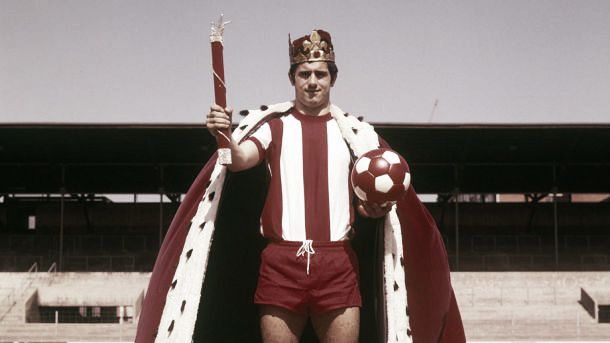The entire footballing fraternity was dealt a cruel blow when the news emerged that Bayern Munich and Germany legend Gerd Müller was suffering from Alzeimer’s Disease. The news became public knowledge shortly before his 70th birthday, which is set to be another milestone in a career defined by great achievements. Thus it is the perfect occasion to pay tribute to one of the greatest footballers to ever take to the pitch, and take a closer look at the phenomenal importance he has had in the development of Bayern into the juggernaut we know today and German football as a whole.
Der Bomber was born in Nördlingen on 3 November 1945, and began his storied footballing career at a club called TSV 1861 Nördlingen, where he scored a magnificent 51 goals in just 31 games in the Bezirksliga Schwaben, showing glimpses of his potential greatness at a young age already. After his solitary professional season at TSV, he joined Bayern in 1964, teaming up with Franz Beckenbauer and Sepp Maier. At this stage the Bavarians were still playing in the then-second-division Regionalliga Süd, but were soon to have their first taste of the Bundesliga they would go on to dominate for the next half-century by winning the league and gaining promotion, thanks in no small part to Müller’s 33 goals in just 26 games.
The rest, as they say, is history, as Bayern became the dominating force in German football – Winning the Bundesliga and DFB Pokal four times, the European Cup an incredible three consecutive times between 1973-74 and 1975-76, along with a European Cup Winners’ Cup in 1966-67 and an Intercontinental Cup in 1976.
"Without the goals of Gerd Müller, Bayern Munich would not be where it is today. What Bayern have today, their palace on the Säbener Straße, that would have stayed a shed without him” – Franz Beckenbauer
Müller himself was instrumental to all these successes. While Maier was peerless in goal and Beckenbauer controlled games with elegance and authority in equal measure, it was the “kleines dickes Müller” (Short fat Müller), as his first coach at Bayern, the Croatian Čik Čajkovski, labeled him, who put the ball in the back of the net and ultimately led Die Roten to their greatest heights. Der Bomber still, to this day, holds the record for most career Bundesliga goals, with an amazing 365 goals in 427 games, while also setting another unbeaten benchmark in 1971-71 by slamming home 40 goals in a single campaign.
One of Germany's best ever
However, it was when pulling on the shirt of Die Nationalmannschaft that Gerd Müller truly showed his greatness. His final tally of 68 goals in 62 internationals for Germany has been surpassed by Miroslav Klose after 40 years, but the latter needed almost twice the amount of games to better Der Bomber’s record. Müller’s four goals in the 1974 FIFA World Cup was crucial in leading Germany to their second World Cup triumph, with the last of his strikes in that particular tournament coming against Johan Cruyff’s Netherlands side in the final to hand the Germans victory. Combined with his 10 goals in the 1970 event, Müller was the World Cup’s all-time leading goal scorer until 2006, when Brazilian striker Ronaldo overtook him, ironically, in the tournament hosted by Germany. Der Bomber der Nation ended his storied international career at the pinnacle of the game after winning the greatest trophy of them all in 1974, having also picked up a European Championship trophy in 1972 – Naturally having ended the tournament as top scorer – In a campaign which saw him score an awe-inspiring 85 goals in the calendar year.
After leaving Bayern after immense success in 1979, Müller joined North American Soccer League club Fort Lauderdale Strikers, spending three years there and scoring 38 goals in 71 games before deciding to end a glittering playing career completely in 1982. However, without football he found himself lost, and developed a debilitating alcohol problem, which necessitated interference from his former colleagues at Bayern to convince him to enter a rehabilitation program. When he returned, Müller was handed a coaching role at Bayern Munich II, which allowed him a lifeline to stay involved in the game that he loved.
"Gerd is a great role model for me. When I came into the amateur ranks at Bayern I got to know him. Gerd told me how to conduct myself as an attacking player in the penalty area - For this I remain very grateful. No-one in Germany has reached Gerd's strike-rate and yet he is totally modest and never seen himself as something special” – Thomas Müller
In 2008 he was honoured by former club Nördlingen, who renamed their stadium as Gerd-Müller-Stadion in recognition for all he has achieved in football. Der Bomber has received a number of personal accolades, among them the 1970 European Player Of The Year Award, the 1970 FIFA World Cup Golden Boot, 1972 European Championship Golden Boot, 9th place in the European Player Of The Century poll in 1999, 13th in the World Player Of The Century voting and was named in the FIFA 100 list by Pele for the 100 greatest living footballers.
Supernatural ability made him so deadly
What made Müller so deadly is the fact that he had an almost supernatural ability to be in the right place at the right time to pounce and put the ball in the back of the net. Something that has often been overlooked is his deceivingly fast acceleration over short distances. Der Bomber had never been known as much of a work-horse, and was very much the book-definition of a poacher. Thus he could surprise opponents with his quickness, as Beckenbauer recalled: "His acceleration was incredible. In training I have played against him and I never had a chance". Due to his short stature, he was also able to turn sharply and get shots off that other players could not, as author David Winner once wrote: “His short legs gave him a strangely low center of gravity, so he could turn quickly and with perfect balance in spaces and at speeds that would cause other players to fall over. He also had a knack of scoring in unlikely situations”. In short, Müller was a once-in-a-lifetime player, the likes of which we have never seen since or will probably ever see again.
"Bayern will always support and help Gerd Müller and his family, whenever is necessary," said Bayern chairman Karl-Heinz Rummenigge when the news of his illness broke. And rightfully so – Without Der Bomber, where would Die Roten and Germany be now?









































